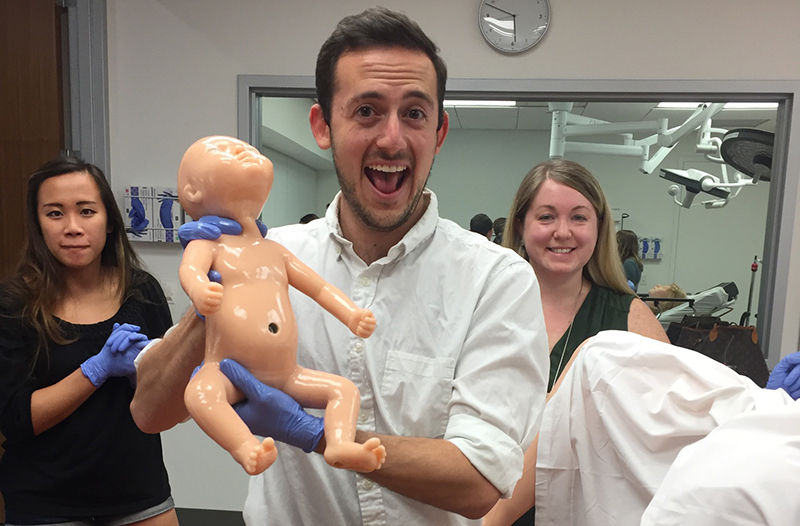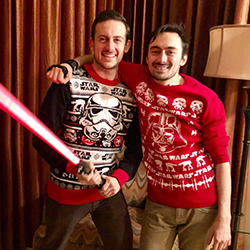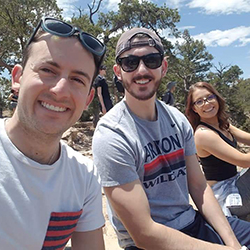
Match Day Student Profile: Daniel Salevitz

For four years, students at the University of Arizona College of Medicine – Phoenix have worked toward Match Day — the day they learn where they will spend the next several years as resident-physicians and a major step toward building their career in medicine. Match results are released nationally at ceremonies coordinated to occur at the exact same time across the country. Members of the Class of 2020 will receive letters that reveal where they will go for their residency training at precisely 9:00 a.m. Friday, March 20. The UA College of Medicine – Phoenix is profiling several students in advance of Match Day 2020.
Meet Daniel Salevitz

Little known fact: He is a board game addict and can spend hours playing board games with friends. He likes everything from card games to complex strategy games with a thousand pieces.
Path toward Medicine
Salevitz applied to medical school three times before he was accepted.
“There were definitely times along the way when my confidence wavered,” he said. “I know there's a long journey ahead, as well, but if you really have a passion for helping people and hearing their stories, there's no reason you can't rest easy at night knowing you've chosen the right career path.”
Growing up, Salevitz had two major medical influences: His father and grandfather are both surgeons.
“I remember when we would be out to dinner as a family, and one of my dad's or grandfather's patients would come over to say hello and thank them for the surgery or treatment they received. I always thought it would be so fulfilling to make a difference in someone's life like that, so I gravitated toward medicine.”
Choosing a Specialty
Salevitz already knows where he will be spending his residency, as urology matches early. He will begin residency in urologic surgery this summer at the Mayo Clinic in Arizona.
He chose urology because he believes it unites several aspects of medicine he loves: long-term patient care, treatment of benign and malignant conditions, and a mix of outpatient clinic with surgical time.
“The majority of urologists I have met are eager to teach and share their passion for the specialty, and I can't wait to pay it forward someday,” he said.
Extracurricular Activities
Throughout medical school Salevitz volunteered at the Wesley Community and Health Center because he thought the experience would hone his clinical skills. He soon realized he also liked interacting with the patients. He worked as a tutor for first- and second-year medical students when he was an MS2, and enjoyed creating study materials to help students excel in their pre-clinical years.
Why the College of Medicine – Phoenix
Among the reasons Salevitz wanted to attend the College of Medicine – Phoenix was that he believed the doctoring curriculum with standardized patients was second to none.
“It's probably the best thing that the school has done to prepare me to be a competent clinician and diagnostician. Also, the anatomy lab and gross anatomy block is awesome. The state-of-the-art facilities and the high faculty to student ratio, especially during anatomy lab sessions, really helped me learn the information.”
Favorite Medical School Memory

Advice to Current or Future Medical Students
His advice is not to panic. Medical school is a long road, but is worth it. Salevitz said he worried that juggling his studies, practicing for the clinical doctoring course, doing research and volunteering would leave him with no time to have fun. That was not the case.
“The college gives its students the resources and support to master the art of being a medical student,” he said.
His best advice: “Make good use of the the learning specialists and tutors on a regular basis.”
About the College
Founded in 2007, the University of Arizona College of Medicine – Phoenix inspires and trains exemplary physicians, scientists and leaders to advance its core missions in education, research, clinical care and service to communities across Arizona. The college’s strength lies in our collaborations and partnerships with clinical affiliates, community organizations and industry sponsors. With our primary affiliate, Banner Health, we are recognized as the premier academic medical center in Phoenix. As an anchor institution of the Phoenix Bioscience Core, the college is home to signature research programs in neurosciences, cardiopulmonary diseases, immunology, informatics and metabolism. These focus areas uniquely position us to drive biomedical research and bolster economic development in the region.
As an urban institution with strong roots in rural and tribal health, the college has graduated more than 1,000 physicians and matriculates 130 students each year. Greater than 60% of matriculating students are from Arizona and many continue training at our GME sponsored residency programs, ultimately pursuing local academic and community-based opportunities. While our traditional four-year program continues to thrive, we will launch our recently approved accelerated three-year medical student curriculum with exclusive focus on primary care. This program is designed to further enhance workforce retention needs across Arizona.
The college has embarked on our strategic plan for 2025 to 2030. Learn more.